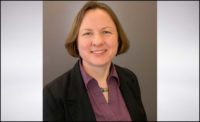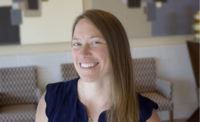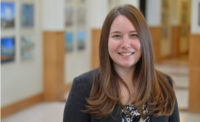Name: Sarah Berseth
Age: 39
Title: Mechanical Engineer, Minneapolis office director, HGA
Educational Experience: Bachelor’s degree in architectural engineering, Pennsylvania State University
Professional Credentials/Accreditations: Professional engineer (P.E.) in Minnesota
Organizational Affiliations/Achievements/Awards: First Place Technology Award, ASHRAE; Citation in Engineering Design Award, U.S. General Services Administration (GSA); and Award of Excellence, Architectural Engineering Institute (AEI).
What caused you to/when did you fall in love with engineering?
I’ve never been one to take a typical, easy path. I knew engineering didn’t have a lot of women, but that didn’t scare me. I have a technical mind and like problem-solving. While attending high school in Delaware, I gravitated toward math and science classes, eventually enrolling in the chemical engineering program at Pennsylvania State University before switching to architectural engineering, which better fit my technical and creative interests.
What has been the most rewarding aspect of working in the skilled trades?
I have worked on a lot of large-scale renovations and historic restorations to upgrade building systems and address occupant health and well-being. These projects are complex in terms of phasing, working within an existing building that was not designed to meet modern code, and balancing different team input. Yet a lot of my expertise is focused on team leadership and managing diverse skill sets. As a project leader, I like to provide clear expectations and goals and allow people to grow and explore new areas of expertise that lead to a successful outcome. It’s rewarding to work closely with many different professionals because everyone adds value to a project. I’m continuously learning from the team —just as I hope they are learning from me as well.
Describe the proudest moment in your career.
I’ve worked on many projects within an integrated team of engineers, architects, contractors, and other construction specialists, including the Arthur J. Altmeyer Social Security Administration building renovation, which is in progress in Woodlawn, Maryland; the B.H. Whipple Federal Office Building Modernization in Minneapolis; and the Minnesota State Capitol Renovation in St. Paul, Minnesota. These examples were all highly complex restorations of existing buildings. One of my proudest accomplishments is a new construction project for the Ramsey County-Shoreview Library in Minnesota. This was a great example of teamwork with a forward-looking client to create a community destination that sets new standards in energy efficiency. After the library opened, I stayed in contact with the client and can report that in its first year of operation, the library used less energy than predicted during energy modeling. The project later won a national First Place Technology Award from ASHRAE, which was a great acknowledgement of our efforts.
What challenges do women face in this profession? Can you give a personal example? Why aren’t there more women in engineering? How can we increase the number of women in engineering?
I’m fortunate to work for an architecture and engineering firm that values diverse expertise of its team members, especially in what traditionally has been a male-dominated profession. HGA provided a perfect venue for me to grow with a culture that encourages professional exploration. I particularly look for opportunities to provide mentorship to other young engineers, especially women who are just getting started. I organized the women’s leadership speed networking session in Minneapolis to help women expand their professional contacts and continue to do one-on-one mentoring at HGA. I also present at national conferences — most recently at the Society of Women Engineers (SWE) National Conference for women engineers — and I’ve written for professional publications, such as the ASHRAE Journal. All of these efforts help promote the visibility of women in engineering.
What does your day-to-day job entail?
I have two roles at HGA: lead mechanical project engineer and Minneapolis office director, where I oversee daily administrative and operational functions of our 240-person office. The past seven months have been particularly challenging as we transitioned to a remote workforce during the pandemic. Working with firm-wide leadership, I focused on maintaining open communication between internal teams and external clients to ensure business continues moving forward. Zoom has become our new reality.
What drives/motivates you every day?
One of my favorite parts of working at HGA as a mechanical engineer is the breadth of projects we work on. No two clients, buildings, teams, or challenges have been the same during my career. It makes the work fun and exciting. In addition, I am constantly impressed by the creativity and depth of experience on our project teams. It drives me to set big goals and work hard to achieve them.
How has the COVID-19 pandemic impacted you personally and professionally?
Mechanical systems, which are more in the news today because of the pandemic than ever before, have a big impact on well-being through temperature control, thermal comfort, air filtration, and outside air — all of which impact occupant health and comfort. COVID-19 and future unknown health risks are posing challenges for building systems. We have a lot of existing building stock that will need to be upgraded and retrofitted with new energy-efficient systems to meet current and future needs. This will lead to more innovation by mechanical engineers.
What remains on your engineering bucket list — what do you aspire to do that you haven’t accomplished yet?
I hope to make engineering a more inclusive profession. I have taken an active role in HGA’s gender and racial equity training, providing a framework to help close the gap for underrepresented groups. Climate change, energy usage, new technology, occupant health and well-being, COVID-19, and future unknown health risks are all posing new opportunities for mechanical engineering and building systems. We need fresh ideas to address these opportunities. By creating a professional culture that is inclusive of women and other groups, we can bring in new perspectives that lead to innovation.
For access to more podcast episodes, click here.
What’s one thing no one knows about you?
I am a runner and triathlete.
List any mentors who’ve helped you succeed and describe exactly how they’ve shaped your success.
I have been fortunate to work with many different men and women who have shaped my career. Early in my career, I worked with a principal who showed me firsthand the benefit of working in a collaborative environment. This individual taught me the value of every member of the team and the impact a leader can have on the success of the team. His leadership style has impacted my career in a tremendous way. He appreciated people. He looked out for his team and did a great job of just “checking in” with people. Most importantly, he had a habit of checking in with team members regardless of how many years of experience they had. If you were an individual working with him, he wanted to know who you were, what you were working on, and what made you tick. In the middle of my career, I got the opportunity to work with a wide variety of senior mechanical engineers, and each one mentored me in unique ways. One of them taught me how to form strong, lasting relationships with clients. Another individual taught me how to be a leader of leaders and build consensus. Finally, from a different engineer, I learned how to have grace when things are challenging and to remain calm under pressure. Each of these individuals shaped my career in meaningful ways, and I would not be the engineer I am today without learning from the examples they set.
What advice do you have for prospective female engineers considering entering the field?
Look for a mentor to emulate and learn from. You can turn to a wide variety of individuals at different stages in their careers with different skills and perspectives who can inspire your own work and career decisions.
To see the entire list of winners, view the January digital edition of Engineered Systems.




